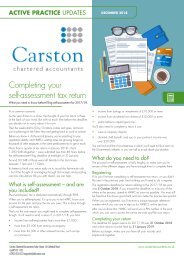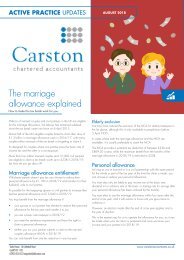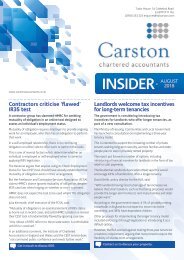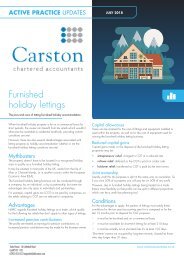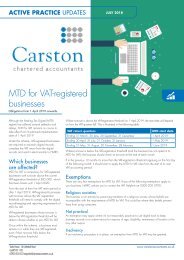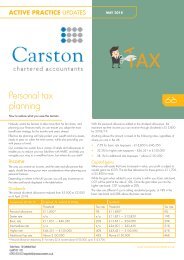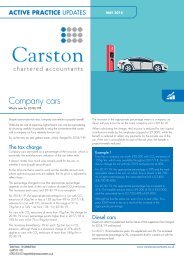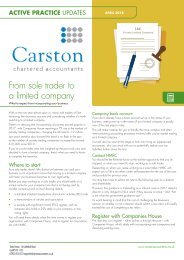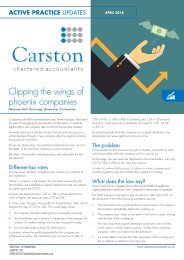Budget Report 2018
Get up to speed with the changes announced in Philip Hammond's Budget with our detailed report.
Get up to speed with the changes announced in Philip Hammond's Budget with our detailed report.
- No tags were found...
You also want an ePaper? Increase the reach of your titles
YUMPU automatically turns print PDFs into web optimized ePapers that Google loves.
6 | Business<br />
Digital services tax<br />
From April 2020, the Government will introduce a 2%<br />
tax on the revenues of certain digital businesses in an<br />
attempt to ensure the amount of tax paid in the UK is<br />
relective of the value derived from their UK users.<br />
The tax will:<br />
• apply to revenues generated from business<br />
activities which include search engines, social<br />
media platforms and online marketplaces<br />
• apply to revenues from those activities that are<br />
linked to the participation of UK users, subject to<br />
a £25m annual allowance<br />
• only apply to groups that generate global<br />
revenues from speciic business activities in<br />
excess of £500m per annum<br />
• include a provision that exempts loss-making<br />
businesses and reduces the effective rate of tax<br />
on businesses with very low proit margins.<br />
UK property income of non-UK<br />
resident companies<br />
From 6 April 2020, non-UK resident companies that<br />
carry on a UK property business, or have other UK<br />
property income, will be charged to corporation tax<br />
rather than being charged to income tax.<br />
The measure has been introduced to prevent<br />
structures that reduce tax bills on UK property held<br />
through offshore ownership.<br />
Change to the definition of<br />
permanent establishment<br />
A new measure is introduced in Finance Bill<br />
<strong>2018</strong>/19 which denies the exemption from being a<br />
UK permanent establishment where non-resident<br />
businesses artiicially fragment their operations to<br />
take advantage of exemptions and avoid creating a<br />
UK permanent establishment.<br />
Corporate capital loss<br />
restriction<br />
From 1 April 2020, the Government will restrict<br />
the proportion of annual capital gains that can be<br />
relieved by brought forward capital losses to 50%.<br />
The announcement will include an allowance that<br />
gives companies unrestricted use of up to £5m<br />
capital or income losses each year.<br />
Intangible fixed asset regime<br />
The Government is to seek to introduce targeted<br />
relief for the cost of goodwill in the acquisition of<br />
businesses with eligible intellectual property from<br />
April 2019.<br />
In addition, with effect from 7 November <strong>2018</strong>, the degrouping<br />
charge rules, which apply when a group sells<br />
a company that owns intangibles, will be reformed to<br />
align with rules elsewhere in the tax system.<br />
Apprenticeships<br />
A package of reforms will be introduced<br />
to strengthen the role of employers in the<br />
apprenticeship programme with one of the main<br />
announcements being to halve the co-investment<br />
rate for apprenticeship training paid by smaller irms<br />
from 10% to 5%.<br />
Class 2 national insurance<br />
contributions<br />
As previously announced in September <strong>2018</strong>, the<br />
Government will not abolish Class 2 NICs during this<br />
Parliament.



